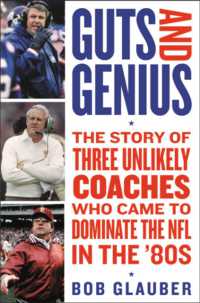- ホーム
- > 洋書
- > 英文書
- > Business / Economics
Full Description
From "learning toy" and "learning society" to "learning city" and "learning organization", what is meant by "learning"?
The main focus of this volume is to increase our understanding of the "learning turn" referring, in this book, to the frequent occurrence and usage of terms in the last few decades where the word "learning" is the premodifier. The authors also offer insights into the use of the word "learning" as a premodifier in the future and discuss what, if anything, may replace it, such as "knowledge" (as in "knowledge management") and "smart" (as in "smart city").
An extensive range of academic disciplines are covered including political science, economics, human geography, philosophy, linguistics, higher education, working life science, management and organization, and marketing.
While a single, overall, unified conclusion is not provided, Making Sense of the Learning Turn presents a variety of voices and perspectives. Some contributors are critical towards the learning turn, explaining it in terms of fashion-following, manipulation, and seduction. Others interpret the learning turn more lightly or suggest a more collective form of learning as an alternative to the individualization of learning that some authors argue has been the case thus far.
Contents
Norman Longworth: Foreword
List of Contributors
PART I. THE LEARNING TURN: A BACKGROUND AND INTRODUCTION
1: Anders Örtenblad: Toward an Increased Understanding of the Learning Turn: Background and Introduction
2: Anders Örtenblad: On the Usage of the Premodifier Learning Among Scholars and Practitioners
3: Bertus van Rooy: Linguistic Modifiers and the Construction of Concept Meaning
PART II. REFLECTING ON LEARNING AND ITS USE AS A PREMODIFIER
4: Marianna Papastephanou: Learnification, Premodifiers and Learning(s)
5: Anke Redecker: Recognition in a Learning World - Topics of Global Education
6: Malcolm Tight: Learning Your Place
7: Leonard Holmes: What is Learning that an Organization (or Anything Else) Can Do It?
8: Rob F. Poell: Is Learning Viewed as a Synonym of Training?
PART III. EXAMINING SINGLE TERMS IN WHICH LEARNING IS THE PREMODIFIER
9: Tyson E. Lewis: "Learning Toys" as Education through Commodification
10: Norman V. Jackson: The Impossibility of the Learning Organization
11: Max Visser: Learning Climate
12: John A. Cotsomitis: The Learning Economy: What do we Mean by the Modifier Learning?
13: Frederik Hertel and Michelle Wicmandy: The Global Learning Economy
14: Hans Chr. Garmann Johnsen and Jon P. Knudsen: Can Regions Learn?
15: Bertus van Rooy and Roosmarijn Rentier: The Meanings of "Learning Organization" from the Perspective of Usage
PART IV. EXAMINING MULTIPLE TERMS IN WHICH LEARNING IS THE PREMODIFIER
16: Michael Reynolds and Russ Vince: Being Alone Together: A Critical Exploration of Learning in "Learning Group" and "Learning Community"
17: Philip Cooke: "Fortune Favors the Prepared Mind": Learning Knowledge without Experience is Not so Smart
18: Anders Örtenblad: Comparing Two Similar Terms in which Learning is the Premodifier: A Study of Seven Term Couples
19: Anders Örtenblad: Belonging and Being Unique: The Dual Function of the Learning Premodifier
PART V. BEYOND LEARNING: ON ITS WAY TOWARD BEING REPLACED BY OTHER COGNITION-ORIENTED PREMODIFIERS SUCH AS KNOWLEDGE AND SMART
20: Marianna Papastephanou: Interpreting the Decline in the Common Use of the Learning Premodifier
21: Anders Örtenblad: Learning City, Knowledge City, Smart City: Three Mountains in the Same Range
Ken Spours: Afterword: Reflections on the Learning Premodifier and the Learning Turn







